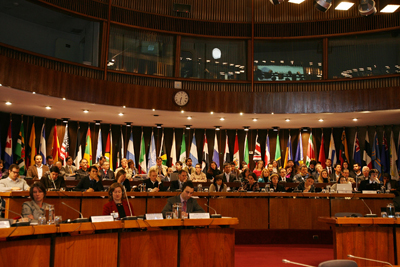Carbon Footprint Poses Challenges to Productive Structure of Developing Countries
International experts analyze the impact of measuring greenhouse gas emissions on global trade.

(03 September 2010) Measuring the amount of greenhouse gas emissions through the carbon footprint would have a strong impact on production and consumption patterns all over the world, particularly in developing countries, stated Alicia Bárcena, Executive Secretary of the Economic Commission for Latin America and the Caribbean (ECLAC) during the inauguration of an international seminar at Commission headquarters in Santiago.
The two-day seminar The Vulnerability of International Trade in Light of the Carbon Footprint was organized by ECLAC with the support of the Government of France and the European Union.
During the event, experts from Latin America, the United States, Europe and Oceania exchanged views on the use of the carbon footprint in trade, the perspective of the region on this issue and its possible impacts and opportunities.
The carbon footprint is an indicator of the amount of greenhouse gas emissions generated during the production and consumption of goods and services and it has increasingly become a factor of competitiveness of internationally traded products.
Some developed countries have announced unilateral initiatives to distinguish the trade of goods and services according to how much they contaminate, such as the carbon label. This label, to come into effect in France in January 2011, indicates the amount of carbon dioxide emissions created during a product's manufacturing, transportation or disposal.
The European Union will demand carbon labeling in 2012, with an even greater scope than the French law. European airlines are in the process of reporting their emissions and will be obligated by law to do so in 2012. The United States Congress is still debating the Clean Energy and Security Act 2009, which will also limit the trade of goods and services based on the carbon footprint.
The implementation of these unilateral measures, although they aim to reduce greenhouse gas emissions, could have repercussions on the economies and trade of developing countries.
In opening the seminar, Bárcena said that climate change is an irrefutable fact and the world is at a historic juncture in international negotiations to try to control contaminating emissions.
"In this context, the carbon footprint poses a much deeper dilemma, because it could mean leveling the playing field among players with very different capabilities," she said.
The Director of ECLAC's Sustainable Development and Human Settlements Division, Joseluis Samaniego, offered a presentation on the current state of emissions in Latin America and the Caribbean and the challenges posed by the adoption of carbon footprint measurements.
"Today the carbon footprint applies to final products. However, domestic competition could lead to its gradual expansion to cover intermediate products and prime materials as well, which would be a greater menace for Latin America and the Caribbean," he warned.
"In addition to the impact of the carbon footprint, there are other footprints, such as water, which is also becoming increasingly important and should be taken into account," added Samaniego. "That is why more policy initiatives from the region are essential."
"Countries in the region should include the carbon footprint in their innovation agenda not only to strengthen their competitiveness, but also in anticipation of eventual protectionist-tending policies discussed in industrialized countries," stated Osvaldo Rosales, Director of ECLAC's International Trade and Integration Division.
Also participating in the inauguration were Gerald Hatler, First Secretary of the European Commission Delegation in Chile, and Laurent Bonneau, Chief of Regional Cooperation of the Embassy of France for the Southern Cone and Brazil, among other prominent officials and experts.
See also:
More information about this seminar is available on the ECLAC webpage.
For enquiries, please contact ECLAC's Public Information and Web Services Section. Email: dpisantiago@cepal.org; telephone: (56-2) 210-2040/2149.
Related content
Seminario: "La vulnerabilidad del comercio internacional frente a la huella de carbono"
Por Alicia Bárcena, Secretaria Ejecutiva de la CEPAL
Contact
Public Information Unit
- prensa@cepal.org
- (56 2) 2210 2040